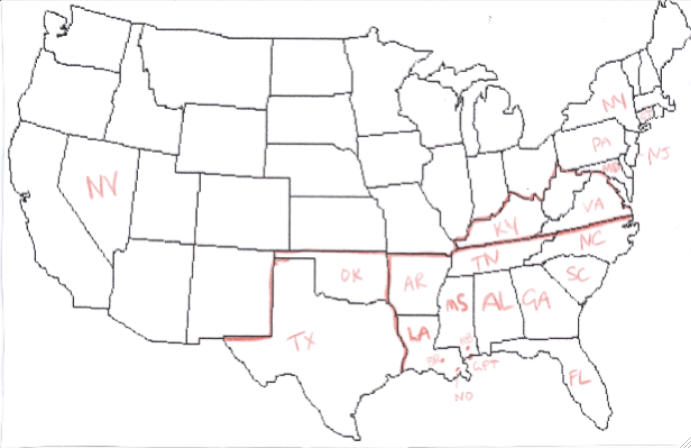Re: Nationalism in general. I think it is a good thing for the most part, so long as it's good-spirited. I have a tendency to think it's less of a good thing in the US where our culture already dominates the world in many ways, but it is already too late to change the fact that most of the world sees us as a national full of ignorant bullies, safe and secure bordered by oceans and weak nations, and complacent in that security.
As for the future of the USA, I worry about us because so many people that live here really are complacent about the rest of the world, complacent about our place at the top of the food chain. And it's not that I necessarily worry so much about falling out of the top spot (if we can even be said to still hold it), but I worry about a plummet to economic hardship like we haven't yet seen. I'm not worried about it to the point of paranoia, but I do wish that we weren't generally so arrogant about our place in the scheme of things. Part of what bolsters that attitude is the way that English is becoming the
lingua franca of the world (and though we do largely have Brit colonialism to thank for that, I have a feeling that Hollywood has helped it along, and it is at least obvious to us that our culture is more widely-endorsed than that of other countries). That leads to the linguistic laziness that CI mentioned earlier in relation to the Aussies. There's a great deal of linguistic variety in the US, especially in the cities and out West where the Hispanic population is increasing, but for the most part, we speak English and that's it. Even the college-educated Americans tend to be unilingual; we might have studied another language, but simply never put it to practical use.
We are a diverse nation with huge differences among regions, though there is a national character. I think we share many traits along those lines with the Canadians - that's why it's so hard to tell us apart - but of course our notorious federal government is a large part of what binds us together.
I was raised in the Deep South. I have a map:

It's not a very good map, but oh well. The outer red border marks off the 'southern' states (though sometimes a couple others are included), and the inner red border marks off the Deep South. The states with the abbreviations in them are ones I have visited, and three of the four dots are for places that I've lived. One of them is New Orleans, just for a reference point (since it is the only major city near me). The southernmost dot in Mississippi is Gulfport, where I have lived most of my life. The dot directly north of that is Hattiesburg, where I live at university (I've spent about 5 years here total). The northernmost dot in Louisiana is Baton Rouge (the capital), where I lived for about six months.
All the blank states are places where I have never been (obviously, I flew out to Nevada). We don't compare with Canada when it comes to population per square mile, but the US is a very, very big place. I feel like I have done a lot of traveling within the US, and obviously there is this huge vast expanse of my country that I have never seen (and might not ever see). My traveling ouside of the Deep South has been fairly minimal, too - two trips up to New Jersey to visit relatives, with a bit of traveling around the area, and that's about it. I have been across the pond to Ireland (mostly Dublin and Cork, for less than 2 weeks), London for a day, Amsterdam for a weekend, with a short trip to The Hague, Vienna for less than two weeks (minus the weekend in the Netherlands), and a train trip across Germany (I got out at one of the stops to smoke, so I at least set foot there).
The Deep South of the US is characterized by religion, racism, and poverty. It's not that these things don't exist in the rest of the US but the statistics show that the Deep South is the poorest (not counting Florida). Our schools have the lowest budgets and the lowest performance records. We're often behind on technology as compared to the Northeast, the West, and even the Midwest (around the Great Lakes). Some parts of Texas fit the Deep South mold, but really Texas is a unique phenomenon. Another interesting thing about the South is that the black population is a good deal higher than anywhere else in the country, primarily because most of the emancipated slaves did not have the means to leave the south, and had to make do with the circumstances. Some stayed because they loved the land and the weather and weren't about to let a bunch of rednecks run them off. The result is that we have some of the most racist white people in the country living alongside the largest black population. Average for the country is about 12% - in the Deep South it's often 30% or higher. It's not a pretty mix, but at the same time, I can see a lot of progress among the youth in MS. Assuming that this open-minded generation doesn't move elsewhere after college, there might be hope for the future of MS. Interestingly, both sides of the racial divide - the blacks and the racist rednecks/Old South and Old Money Republicans - are the most religious. I'm hoping that the Methodist church continues to steal members from the Southern Baptists of both races, because Mississippi Methodists, particularly those in the larger towns I've mentioned, are starting to become very liberal. Some churches are even openly accepting of gay members, and would probably marry them if it were ever legalized (not likely in MS, since the state constitution has already been amended to ban it). I have been playing piano for a Unitarian Universalist gig in Hattiesburg recently, and I was amazed there was such a thing in MS. They're small, but I think they might grow if they start promoting on campus (which they've never done before).
Louisiana also has its own character that for the most part does not fit the Deep South mold at all. For one, they're primarily Catholic. That might not seem to be a big difference to you folks that don't take religion all that seriously, but it's a pretty big deal in the Deep South. The Methodists co-exist well with either the Southern Baptists or the Catholics, but Southern Baptists and Catholics do not get on well at all. Also, Catholic symbology and holidays and that sort of thing adds a certain something, and people in Louisiana tend to take religion just as seriously as the Southern Baptists, but they don't have any moral issues with going to
Bourbon Street on a Saturday night and getting hammered. At least, not until they show up to church the next morning, at which time they feel really horrible about having done it, so they confess and take communion and pray and say a few rosaries or whatever, and when they walk out the door they're over it.
Northern Louisiana is more in the Deep South mold. A pretty good general rule is that the further you get from New Orleans and the coast, the less coonass the natives become ('coonass' is used as a racial slur against black people in some parts of the Deep South, but in Louisiana, it means
cajun). Those that live south of New Orleans, and around the Atchafalaya Basin (affectionately known as
the bayou, an abandoned course of the Mississippi river) are generally thought to be more coonass than anyone. It's partly a cultural heritage thing, as evidenced by the links, and partly a multi-generational tie to the swampy land of southern Louisiana. It's swampy because it's the endpoint of the continent's biggest drainage basin, the Mississippi river basin. It breeds strange people, and if you don't know what I'm talking about, read some Anne Rice. Also, some of you saw the
video someone posted in the oil spill thread, with a local woman who gave a speech about the issues with the work crews and such. Everyone across the world seemed really impressed with her speaking abilities, since she was uneducated (and typically, the more educated you get, the less coonass you become), but for a coonass rant, it was pretty unremarkable. I know hundreds of women just like her. I suppose that's a horribly stereotypical thing to say, but I don't really mean it. They're all different people, but they sometimes seem to be cut from the same mold. The women and men alike are almost without exception not afraid to say what's on their minds, not afraid to offend, not ashamed of their often-debaucherous lifestyles, not ashamed of being poor and uneducated. They generally have an accent that the woman on the video didn't really have. She had more of a typical southern accent, whereas the coonass accent has more similarity to the accent of the first woman in
this video, and the girl that shows up at 5:26 is more typical of what I was talking about (though they're city girls, rather than bayou girls). The accent is compared to a Brooklyn accent, but it sounds similar to a lot of Northeastern US accents to me.
Mississippi is a lot less interesting. There's a bit of culture mixing on the coast, where I'm from - there are more Catholics in the coastal county that borders Louisiana than anywhere else in the state except maybe Biloxi (pronounced bih-LUCKS-ee). There are I think 81 counties in Mississippi, and three of them touch the coast of the Gulf. The middle one, Harrison, is my county. Gulfport is in the middle of the county, and is bordered by Biloxi on the east. None of the other towns on the coast come close to Gulfport and Biloxi in population - I think both towns have around 100,000 people, maybe a little less - and the only town in the state that is bigger is Jackson, the capital (around 250,000 I think). Hattiesburg, my school town, is one of the few towns in the state that approaches Gulfport and Biloxi in size (around 60-80,000).
So, the schools I attended as a child were far above the average school in MS in budget and performance, and that is I'm sure the only reason why MS is represented on this forum. There was one other Mississippian here, Pilgrim (does he still post?), and he lives in Hattiesburg. There are vast stretches of Mississippi where the average person has never read a whole book, and probably dropped out of school as soon as it was legal (age 16) if not before (somehow). There are people who are raised in these towns that go on to higher education, but they generally don't go back. I can't claim to be terribly familiar with even most of my state, but both sides of my family were from small MS towns. Both of my dad's parents lived in a little place called Mendenhall, or in D'Lo, a town right outside Mendenhall - they're both on the main highway that runs north from the coast, between Hattiesburg and Jackson. There might be 3,000 people between the two towns. My mom's dad was from a small town in north MS called Macon, another one with less than 3,000 people and about an hour's drive to a town of significant size.
Interstate 10 runs parallel to the coastline in MS:

...and to those of us who live on the coast, anything north of I-10 is 'country'. We consider ourselves to be relatively progressive as compared to the rest of the state, but north of the city limits of the coastal towns is for the most part unincorporated land. Most of the people who live there work in the coastal towns (often as blue collar workers), but they go home to their place out in the country, where the land is cheaper and the plots bigger, neighbors much further away, sometimes not even visible from your house. Some of it is farmland that supplies the coast, but most of the farmland is further north where it's too far to comfortably commute into the coastal towns, so there is actually a progression of how 'country' it is, the further north you go, but it's all the same to us on the coast. I-10 is also the standard 'safe line' for hurricanes. If you live near the water (like I always have), if you're going to stay in town for a hurricane (which I always do), then you have to stay at a friend's house north of the interstate or a family member's house that isn't near water. When I was a kid, we always went to my grandma's house in Woolmarket, which is north of Biloxi. She died a few years before Katrina, so I spent Katrina at my friend Tabitha's house, barely north of the interstate inside Gulfport (only Gulfport and Biloxi have city limits north of the interstate, out of all the coastal towns).
Those two stars in Louisiana on I-10 are Baton Rouge and New Orleans. I only lived in Baton Rouge for six months, but I hung out there a lot over the course of about 5 years or so. It's the capital of the state, but also a college town; Louisiana State University is one of the better schools of the Deep South, recognized across the country for sports, with a solid academic reputation. My friends all lived in a neighborhood that was just north of the LSU campus, a part of the older grid framework of the city where the streets are named after states and presidents. The neighborhood was one of those run-down old neighborhoods common to most US cities where the black population was high, but in an effort to fight the ghetto, a lot of the houses were bought up to rent to (mostly white) college students, though some streets are still very much ghetto. The neighborhood over the years became primarily occupied by LSU dropouts, and was known for nightly keg parties. Somewhere on those few blocks, there would be a keg party, every night, often at several houses. I had one at my house for a friend's birthday, and a few hundred people showed up, most of whom I had never met before, and we had midget wrestling in the front room. It was awesome. Another thing I encountered at those parties for the first time: drum circles. Some people collect percussion instruments just for keg parties. On Halloween, there would be a block party on Carlotta Street. The cops closed off the street and left it alone until 2am, at which time the law required them to break it up. The street was long enough that there were 2 or 3 different places for live music, and the music culture in BR was not bad. Way better than MS, if not as great as NO.
My school, the University of Southern Mississippi, is not so well known as LSU, but it's still a good school. There are three major federally-supported universities in MS: the University of Mississipi, known as 'Ole Miss', in Oxford, MS (north part of the state, near Tupelo, where Elvis was born); Mississippi State University in Starkville (northeast MS), which started out as the agricultural school; and my school, USM, otherwise known as 'Southern Miss'. We're mostly known for having produced Brett Favre, though Jimmy Buffet is a well-known dropout. The music school is one of the best in the south, so here I am.
I might share more later, but I think that's enough about my little corner of the USA for now.

 Help
Help



























